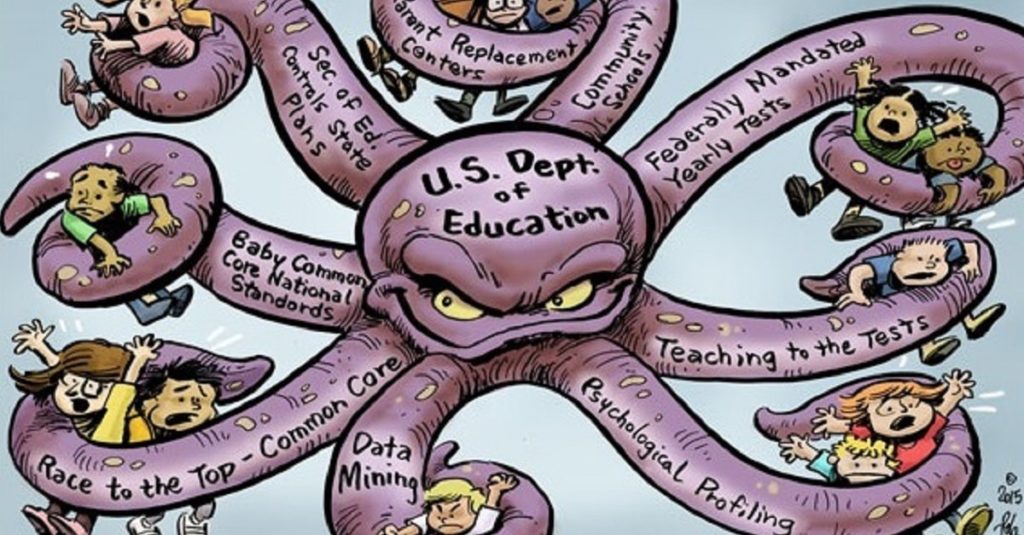Lawmakers Still Pushing “Personalized Learning” Despite Huge Problems
In this article written for The National Pulse, Dr. Karen Effrem lays out the details regarding the implementation of personalized learning in public education, especially how large tech companies are lobbying the state and federal governments to implement it, despite its problems.
The corporate technology push of machine-based skills training continues to march across the nation. This effort goes by the names such as “competency-based education” (CBE), “personalized learning,” and “mastery education.” It has been well described by Jane Robbins, Peter Greene, here and in this space.
The latest is a bill in Florida that seeks to expand what was supposed to be a five-year pilot project for four school districts and the University of Florida experimental school to all 67 Florida school districts after only two and a half years. This expansion is problematic, not only because of an absence of data showing its effectiveness in any of the pilot counties, but also because of the clear evidence that it failed in Lake County, one of the original pilot districts. Lake County experienced a significant drop in graduation rates, and the grade for the high school implementing the pilot dropped from a B to a D.
Bill Gates, who was funding Lake County’s CBE effort before it failed, has admitted that education technology has not improved academic performance in general. It should be noted that just about every Gates education venture has been a failure. In addition to Common Core and CBE, the teacher evaluation grants in Hillsborough County, Fla., cost that county’s taxpayers an extra $24 million and were a total failure. Even the smaller school-to-work learning communities which preceded Common Core also failed.
Parents, initially quite enthusiastic about the advertised glories of CBE, have quickly learned in most instances that these promises have all the substance of cotton candy in the rain. For example, 73 percent of middle school parents in the MacPherson, Kan., school district stated in a survey that they would prefer their students not be in a class using Summit Basecamp personalized learning (CBE) digital learning platform due to academic, privacy, physiological and psychological concerns. Parents in Cheshire, Conn., and Indiana, Pa., have been able to stop the use of the Summit in their school districts due to concerns about academic achievement and data privacy.
The Summit Basecamp platform is a joint venture between the Summit charter schools and the Chan-Zuckerburg Initiative founded by Facebook CEO Mark Zuckerburg and his wife Priscilla Chan. There are many other instances of parental anger and removal of their children from schools using this platform, well explained by Leonie Haimson of the Parent Coalition for Student Privacy. Interestingly, Summit boasts of a research collaboration with Harvard, but refused to be studied by Harvard researchers.
Data collection, including psychological data, in CBE is extensive, with the FBI issuing public service announcements warning of the privacy dangers related to education technology. One education technology company called Knewton brags about being able to collect 5-10 million actionable data points per student per day as they interact with Common Core curriculum and embedded assessments, and another called Dream Box boasts of collecting 100,000 data points per student per hour. These are the kinds of platforms commonly used in CBE.
The full article can be viewed at The National Pulse’s website.
New Law, Same Story: Fed Ed Tyranny Continues Under ESSA
In this article for The National Pulse, Dr. Karen Effrem details some examples of the federal education system cracking down on states such as Arizona, Utah, and Alabama which were non-compliant with federal education standards and were subsequently defunded.
The Every Student Succeeds Act (ESSA) passed Congress in 2015 despite the strong protests of more than 200 organizations and leaders after claims by leadership about the legislation:
“Prohibiting the Secretary of Education from forcing, coercing, or incentivizing states into adopting Common Core”
“Ending the era of federally mandated high-stakes tests”
“Eliminating the federally mandated one-size-fits-all accountability system”
All of these claims were false then and continue to show themselves false now. Even though ESSA prohibits the secretary of education from incentivizing or coercing Common Core, that is closing the barn door after the horse is already gone. There is no enforcement mechanism, most states have already adopted Common Core, any state standards changes have been purely cosmetic, and the law itself still requires Common Core or standards very much like them, as admitted by former Obama education officials, so it is irrelevant what the secretary does in the future.
One of the other biggest concerns by both citizens and state and local officials was the continued oppressive control over state and local education by the federal government — features remaining from ESSA’s predecessor, No Child Left Behind. One of the biggest and strongest objections was the law giving the education secretary veto power over state plans.
The latest example of federal tyranny in this area is the written threat by Frank Brogan, assistant secretary of elementary and secondary education, to withhold $340 million of Title I funds from Arizona because the state is not toeing the federal line in technical requirements for a waiver to offer a different high school test — the ACT or SAT — in place of the Arizona statewide standardized test for high school math, English and science.
In 2017, Alabama also wanted a one-year waiver from federal testing requirements while it sought to develop or purchase a new test to replace the highly unsatisfactory ACT Aspire. The Aspire was not providing questions to schools and teachers to give them an idea about how to help students improve. However, the Alabama request was denied by then Acting Deputy Secretary Jason Botel, a Common Core and social justice supporter, who eventually left USED. Nevertheless, Alabama proceeded on their own to use a different test — Scantron, formerly Global Scholar, which had already been in wide use in Alabama as an interim assessment for its statewide test — while the next test is chosen for the 2020 administration.
Utah also applied for a waiver on ESSA’s 95-percent testing participation mandate. As explained by Jane Robbins, the waiver was requested because:
“…state law specifically protects the rights of parents to opt their children out of statewide assessments. It also forbids the State Board of Education from imposing negative consequences on schools or employees because of the number of opt-outs.
One reason for the rising opt-out numbers is discontent with the SAGE (Student Assessment for Growth and Excellence) test. SAGE was developed for Utah by the American Institutes for Research, which is not an academic-assessment company but rather a behavioral-research organization. In increasing numbers, parents have concluded they don’t want their children subjected to problem-riddled testing that hasn’t been proven academically valid – especially when, as shown by Dr. Christopher Tienken, Common Core testing is designed more to centralize control over education policy than to benefit student learning.
The clash here, then, was between parents’ inherent right to govern their children’s education and indeed protect them from harm, as explicitly protected by state law, and federal mandates. Guess which won?
On May 31 the U.S. Department of Education (USED) denied the request for a waiver. USED found that a waiver wouldn’t “advance academic achievement” as required by the statutory waiver provision, because failure to force test participation would mean not all students were subjected to federally incentivized standards and federally mandated tests. “
The rest of the article can be viewed here on the National Pulse’s website.
Here Comes Big Brother: Home Visiting Laws Threaten Parental Rights Nationwide
In this article for The National Pulse, Dr. Karen Effrem details the slow degradation of parental rights in federal education across the board.
Now that researchers and the staunchest proponents of the progressive nanny state are starting to admit that government preschool programs are failing to improve academic achievement for poor children, the big-government Left is joining with the corporate establishment to expand the even more invasive and still unsuccessful idea of home visiting. Bills are being pushed to do so in deep blue states like Minnesota, Oregon and Washington — plus, as documented by Cheri Kiesecker, in other states like Iowa, Maine, New Hampshire and New Mexico.
The many problems with these programs have been documented in-depth at The Federalist and in this space (see here and here). Here is a review of the major concerns:
Lack of Consent for Referrals
The word “consent” for referrals does not exist in the Minnesota, Oregon or Washington bills. This means that government bureaucrats are or will be mining the poorly protected (by HIPAA, FERPA, etc.) health, education, social services, family, and other data of expectant mothers and siblings to determine which families need a visit from Big Brother. Although several of these bills say that families may refuse the visits without consequences, this is another data point that will be added to the family’s lifelong government data file.
Loss of Fourth Amendment Rights
Families may unknowingly give up Fourth Amendment rights by accepting home visits from mandated reporters who collect much data on the family and whose government-determined opinions and cultural norms may be quite different from the families they visit when deciding what constitutes abuse or neglect.
Also alarming on the parental rights front is an Iowa bill that requires home visits by school officials once per quarter for homeschooling families, and if the parents refuse, the home visitors can get a court order with “probable cause” to enter the home anyway to interview and observe the child. Kiesecker asks the very relevant question:
The 4th Amendment says probable cause means when you have reason to believe that a crime has been committed and that evidence of the crime will be found in the place to be searched. Is home schooling a crime? [Emphasis in original]
Differences in Philosophy Between Parents and Home Visitors
Any parent knows that there are a myriad of views on a whole range of parenting issues from discipline to if, how and when children are evaluated and treated for social, emotional issues when the screening instruments are admitted to be far from reliable. These differences are exacerbated by cultural differences among the many ethnic groups that may be receiving home visits.
However, under American cultural and historical tradition and current jurisprudence, parents, unless there is evidence of real abuse or neglect, have the ultimate right to make decisions about the raising and upbringing of their children. These bills are trying to end that parental autonomy and turn us into a literal nanny state like Norway.
Extensive Data Collection Without Consent
Family data is the pre-eminent goal of home visiting programs. Data is the lifeblood of these programs both for public and private funders. Data elements for government include whether and how long a mother breast-feeds, her depression screening scores and other family mental health information, education status, and program participation history for all the family members.
Foundations like the Pew Charitable Trust are also big into the home visiting data mining game. They want as much data on individual family members as possible, especially on the young children targeted by the visits. Particularly important to them are the SEL data, even though it is very hard to accurately assess even for highly trained professionals like psychologists and psychiatrists:
By documenting, on a regular basis, how children are developing in key domains—including literacy, executive functioning, socio-emotional security, and fine and gross motor skills—family support providers gain critical information for improving program content, and states gain confidence in the ability of these investments to improve school readiness.
Inconsistent Training of Home Visitors
As with preschool and K-12, especially regarding SEL issues, the level of training for visitors can vary substantially. One study found that success varied with how the program was organized even when attempting to implement an established home visiting model. Additionally, the study found there was “difficulty programs faced in retaining participants.” Finally, as also discussed above, information presented may be unscientific or biased, resulting in government-directed parenting.
The rest of the article can be viewed here at The National Pulse’s website.
New Report: 50 Years of ‘Fed Ed’ Has Failed to Close Achievement Gap
This article written by Dr. Karen Effrem for The National Pulse details the failings of the U.S. federal education system to raise the academic performance for underprivileged students.
A History of Fed Ed: From ESEA to Common Core
That federal interference started with the Elementary and Secondary Education Act (ESEA), which began compensatory grants for poor children in K-12, and Head Start, the federal preschool program, both passed in 1965. Both laws, plus the General Education Provisions Act (GEPA), started out relatively benignly with all sorts of comforting language about how the federal government was not going to interfere in local autonomy regarding curriculum, etc.
However, both federal education laws have gradually increased the iron grip of federal control over states and school districts over the last fifty years. These three statutory provisions protecting local control have essentially been ignored.
First, the feds imposed statewide standards and tests on states as a prerequisite for federal funds in the 1994 reauthorization of ESEA, called the Improving America’s Schools Act. Not only did they take away school district autonomy in choosing standards and tests, but they also required those standards to comply with the federal Goals 2000 standards. Goals 2000 was an intensification of federal control of both state and federal pre-K programs that had to comply with Head Start — and also marked the first time that “social emotional learning” appeared in the federal education lexicon.
Then came the 2001 version of ESEA, called the No Child Left Behind Act (NCLB). It ratcheted up federal control even more by requiring statewide tests in math and English/reading every year in grades 3-8 and science once in elementary, middle, and high school. SEL and preschool elements from the 1994 bill also survived in the new version. However, the worst part of NCLB was the completely unrealistic 100-percent proficiency requirement in math and English by 2014 for every subgroup under the threat of districts losing federal funding.
Years later, the Obama administration then used that threat plus the Great Recession to bribe/coerce states into adopting Common Core via illegal waivers and the Race to the Top grant program, all well explained in the white paper by Robert Eitel and Kent Talbert: “The Road to a National Curriculum — The Legal Aspects of the Common Core Standards, Race to the Top, and Conditional Waivers.”
The rest of the article can be viewed on The National Pulse’s website.
Issues
- Assessments + Testing (25)
- Bullying/Sex Education (6)
- Child Protection League (2)
- Common Core Standards (78)
- Curriculum + Standards (65)
- Data Collection and Data Privacy (64)
- Early Education/Nanny State (75)
- Federal Education (128)
- International Education (6)
- LGBT Issues in Education (9)
- Media Appearances (4)
- PL/CBE (2)
- Planned Economy (11)
- Politics of Education (26)
- School Violence (9)
- Social Emotional Learning/Mental Health (52)
- State Education (89)
- Testimony/Presentations (17)
- Uncategorized (13)
- Unions (10)
Education Liberty Watch Projects
ELW Allies
- American Principles Project
- Cato Institute
- Conservative Teachers of America
- Constitutional Coalition
- Eagle Forum
- Minnesota Advocates and Champions for Children
- Missouri Education Watchdog
- Restore Oklahoma Parent Empowerment
- Stop Common Core
- The Pioneer Institute
- Truth in American Education
- What is Common Core – Education Without Representation



